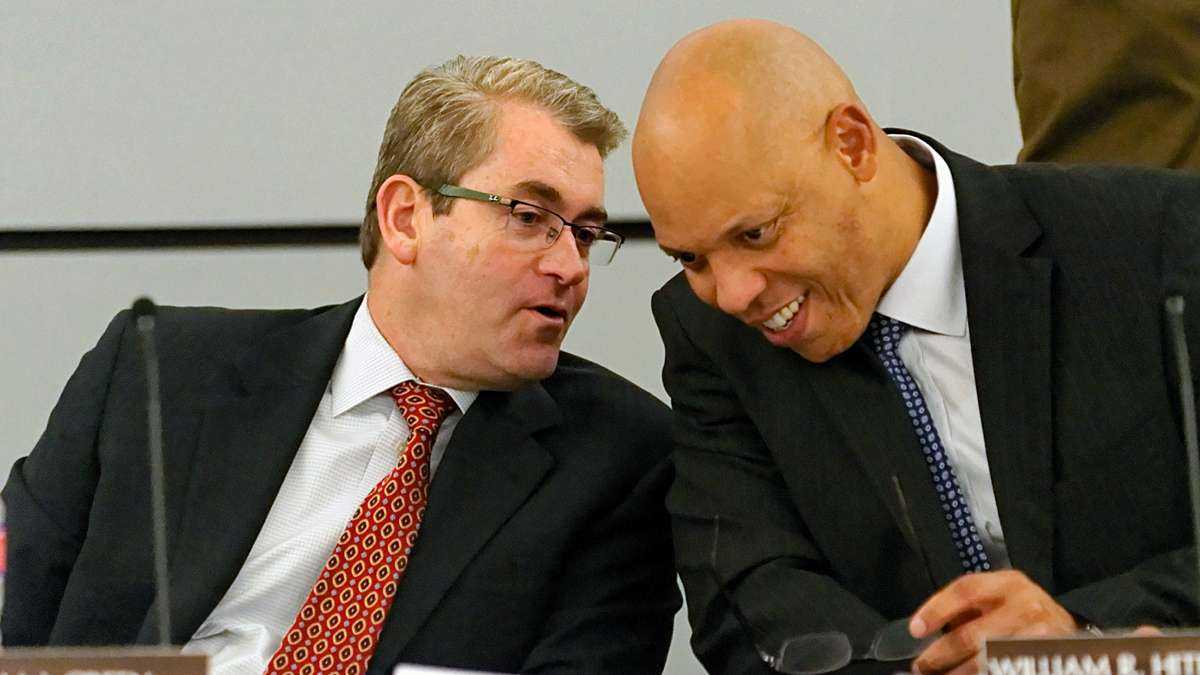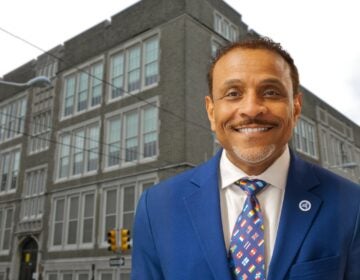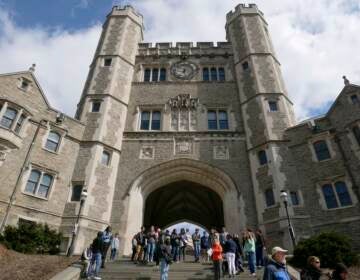Contentious debate over Philly charter expansion comes to a head Wednesday
Listen
Philadelphia School Reform Commission Chairman Bill Green, left, and Superintendent William Hite chat at an October SRC meeting. (Bas Slabbers/for NewsWorks)
It’s one of the essential questions of urban education. If you can give some children a better opportunity, but you potentially undermine the system as a whole, what should you do?
The Philadelphia School Reform Commission has been weighing this as it’s considered 39 applications for new city charter schools that, if approved, could vastly alter how the city educates its children.
For months the question has roiled the city’s educational landscape, revealing deep philosophical divisions between those who call for systemic reform and those fearful of exacerbating existing inequities.
With three sons in the city’s public schools, West Philadelphia parent Rogev Duckett understands the heart of the charter debate as well as any.
His eldest is a senior at the district-run magnet school Parkway Northwest. His middle son attends Global Leadership Academy Charter, and his youngest goes to Martha Washington Elementary, a district neighborhood school.
Although he praises Martha Washington’s autistic-support programming, Duckett would love for his son to attend Global Leadership Academy because, he said, budget cuts have taken key resources from the school.
“It’s kind of bothersome to think about what kind of atmosphere he has to learn in,” he said. “I think they don’t have the proper funding to provide the type of counseling and support that each student needs.”
Duckett’s youngest son has been wait-listed by a Global Leadership Academy (which has asked the SRC for an additional charter), and so, in theory, he supports charter expansion, but he too worries about the impacts on the system overall.
“I don’t think it’s a win if other students are put at a disadvantage,” he said. “That wouldn’t make sense.”
Stability or ‘smoke and mirrors’?
Duckett’s internal debate has been played out on the political stage, big and small, over the past few months.
“Gov. Wolf has serious concerns about the approval of more charters at a time when he believes that the School Reform Commission has to stabilize, not worsen, the district’s finances,” said Wolf spokesman Jeffrey Sheridan. “The district cannot spend money it doesn’t have for new charters or other expenses.”
Public Citizens for Children and Youth echoed that sentiment, saying the district shouldn’t approve any new charters at this time because it would negatively affect those remaining in district schools.
The Philadelphia School Partnership, which falls squarely in the ed-reform camp, offered $25 million to help defray the added costs of approving the applicants who now run schools given high marks by the state’s school performance profile.
The district countered that those “stranded costs” over six years could reach a half billion dollars, saying that each new charter seat would cost $7,000 a year – diminishing over time only through staff layoffs and, eventually, school closures.
The district faces an $80 million shortfall in order to provide its students next year with the same bare-bones, “inadequate” resources as this year.
PSP disputes the district’s stranded-cost figure.
Republican leaders in Harrisburg, who have been monitoring the debate closely, have also been skeptical of the district’s accounting.
“That’s smoke and mirrors,” said House Speaker Mike Turzai, R-Allegheny.
Politics at play
Of the 39 applications, Turzai said 27 were submitted by applicants who run existing schools that score higher on the state’s school-performance profile index than the school district’s overall average.
“The fact of the matter is that there’s a demand from parents and grandparents, and the opportunity to give them that lifeline is now,” said Turzai.
Turzai would not directly answer questions about the fiscal implications of the SRC approving the 27 applicants he favors.
“Look, that’s not the issue in front of us,” he said. “The issue in front of us, right now, is that parents and grandparents are asking for these charter schools.”
State Rep. John Taylor, R-Philadelphia, the city delegation’s lone Republican lawmaker, wrote the legislation that compelled the district to hear new charter applications this year. It was attached to the Philadelphia’s new $2 per pack tax on cigarettes.
He’s hoping to see “as many qualified applicants approved as possible.”
“You can’t say we’re just going to take care of all the existing schools and then let tens of thousands of people who want other opportunities to wait until we happen to have some money,” said Taylor. “That’s never going to happen.”
Taylor, though, specifically called for Republicans in the House and Senate to “put your money where your mouth is.”
“If we’re the proponents of charters, the proponents of choice in education, then we’ve got to come up with the proper funding,” said Taylor, specifically adding that lawmakers must reinstate the line-item cut in Gov. Tom Corbett’s first year that helped defray the added costs of charters.
Republican leaders in the state Senate have also urged the SRC to approve high quality applicants.
The debate has also stirred up contention in the race to be Philadelphia’s next mayor. Jim Kenney, Lynne Abraham, Nelson Diaz and Doug Oliver all have signed a letter written by the Philadelphia Coalition Advocating for Public Schools urging the SRC to vote against all charter growth.
State Sen. Anthony Hardy Williams, D-Philadelphia, long an advocate for charters and vouchers, has been the lone vocal supporter of expansion.
Current Mayor Michael Nutter said he trusts the SRC to make the right decisions.
“In recent years, the commission has demonstrated leadership by making tough decisions on funding and facilities, but it’s profoundly unfair that the SRC is now placed in a position where it must choose between expanding quality education for some children at the expense of another group of children,” said Nutter. “And that’s why Pennsylvania desperately needs a full and fair education funding formula for all its school districts and the children they serve, as well as one that properly accounts for charter school costs.”
Playing umpire
The contentious debate will come to a head at a public hearing Wednesday at 3:30 p.m. at district headquarters as the SRC takes the issue to a vote. Teachers, parents and advocates for both viewpoints are expected to turn out in large numbers.
SRC Chairman Bill Green says the commission will call “balls and strikes” based on “the merits of the applicants” and “the precedent of the charter law” – downplaying the idea that the district can reject applicants based on its own woeful fiscal outlook.
“Although it creates additional uncertainties for the district that it doesn’t need,” he said, “we have had every branch of government in Harrisburg say that we are going to get additional funding next year.”
But the charter law, which has not been revised since 1998, gives no clear guidance on what makes an application pass muster. It lists several criteria that school governing bodies must consider when evaluating charter applications, but says they are “not limited to” considering those factors alone.
District spokesman Fernando Gallard said that Green was referring to case law – legal decisions made by state courts that have been asked to interpret the law.
He said legal counsel briefed the SRC on two cases in which appellate courts said that districts could not consider the financial implications that charter schools would have on a district in denying a charter applicant who was otherwise qualified.
But neither of those cases involved districts that have been declared financially distressed, as Philadelphia has, said David Lapp, an attorney with the Education Law Center.
“I think there is also a strong argument to be made that the school districts in those cases didn’t meet their evidentiary burden of proving that the impact of charter expansion would be negative,” he said.
But another case also looms large in the debate over whether the SRC has the power to cite financial distress in seeking to curb charter growth. The law establishing the School Reform Commission gave it special powers, including the ability to suspend parts of the Pennsylvania School Code. The SRC used these powers to establish new charter-authorizing policies, including feeder patterns and enrollment caps.
The West Philadelphia Achievement Charter School challenged these limits in court, and, so far, it’s won a temporary restraining order preventing the SRC from moving forward with its new policies. The state Supreme Court heard arguments in September.
SRC member Marge Neff said that regardless of the legal complexities, as far as she’s concerned, “the financial picture muddies the waters completely.”
“I know where I stand, I know what I believe is our responsibility, and I know that everyone is struggling with how to do this right for all of the kids,” she said.
The current financial situation “places us in a position of choosing charter schools or district schools,” she said. “I don’t like that at all.”
Applicants rejected Wednesday can appeal to the state charter appeals board.
Reporter Dale Mezzacappa and intern Allison Welton of the Philadelphia Public School Notebook contributed to this report.
WHYY is your source for fact-based, in-depth journalism and information. As a nonprofit organization, we rely on financial support from readers like you. Please give today.





